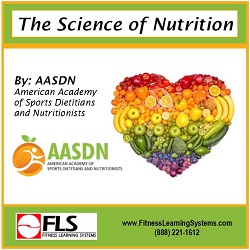
ISBN# ISBN# 978-1-935746-55-3
Course Description:
The percentage of consumers (your clients) who actively seek information about nutrition and healthful eating has more than doubled from 19% in 2000 to 46% in 2011. It is important for health-fitness professionals to be properly qualified and guided to join the fight against obesity with science-based information and counsel for clients following the Academy of Nutrition and Dietetics (AND) guidelines.
The AASDN creates a fundamental understanding of science-based nutrition concepts in this course. The goal is to allow you to be able to better separate the science-based food and nutrition information from the plethora of misinformation, to properly advise and communicate about nutrition with your clients.
Education Level: Intermediate to Advanced
Prerequisites: None
Successful completion of the quiz is necessary to receive Continuing Education Credit.
Approved for:
| 5.0 | American College of Sports Medicine (ACSM) |
| 0.5 | International Accreditors for Continuing Education and Training (IACET) |
| 0.5 | National Association for Fitness Certification (NAFC) |
| 2.5 | National Council on Strength & Fitness (NCSF) |
| 2.0 | National Federation of Professional Trainers (NFPT) |
| 5.0 | National Strength Professionals Association (NSPA) |
| 5.0 | YMCA |
Course Objectives:
After completing this course you will be able to:
- Describe the basic biology of cells and tissues in the human body, and their relationship to the study of nutrition.
- Define digestion and absorption.
- Briefly describe the vascular and lymphatic systems.
- Define calories and identify the number of calories in the macro and micro nutrients.
- Define metabolism, anabolism, catabolism, and homeostasis and discuss their importance in the human body.
- Describe the importance and relationship of 4 dietary guideline systems.
- Explain the function and role of carbohydrates in the human body and diet including:
- Digestion and absorption
- Glycogen
- Glucose homeostasis
- Gluconeogenesis
- Ketosis
- Glycemic index
- Insulin resistance
- Dietary fiber
- Alcohol
- Sweeteners
- Explain the function and role of lipids in the human body and diet including:
- Triglycerides and phospholipids
- Fatty acids
- Essential fatty acids
- Steroids
- Digestion and absorption
- Transport of lipids
- Explain the function and role of proteins in the human body and diet including:
- Amino acids
- Nitrogen
- Digestion and absorption
- Protein transport
- Protein quality
- Discuss the role of and requirements for water in the human body and diet.
- Describe the role of, and requirements for, the 2 micronutrients in the human body and diet.
- Explain how energy is produced in the human body and what systems are involved including:
- ATP-PC
- Glycolysis
- Tricarboxylic Acid (TCA) Cycle
- Electron Transport Chain
- ATP
- Discuss energy nutrient utilization in the human body.
- Identify the current concepts for energy intake including:
- Nutrient timing/periodization
- Carbohydrates
- Fats
- Proteins
- Fluids
- Micronutrients
- Explain 4 aspects of determining and meeting energy needs for the human diet.
System Requirements to View This Course
This course is tablet enabled and can be viewed on an iPad or Android tablet as well as a PC or MAC Computer
